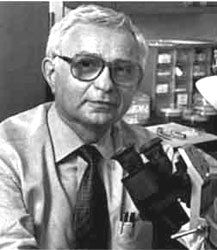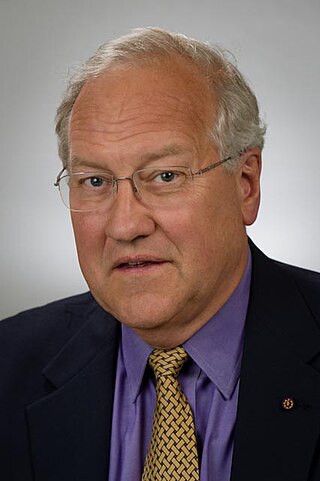Related Research Articles
Thomas Eugene Shenk is an American virologist. He is currently Emeritus Professor of Life Sciences in the Department of Molecular Biology at Princeton University.

Virology is a peer-reviewed scientific journal in virology. Established in 1955 by George Hirst, Lindsay Black and Salvador Luria, it is the earliest English-only journal to specialize in the field. The journal covers basic research into viruses affecting animals, plants, bacteria and fungi, including their molecular biology, structure, assembly, pathogenesis, immunity, interactions with the host cell, evolution and ecology. Molecular aspects of control and prevention are also covered, as well as viral vectors and gene therapy, but clinical virology is excluded. As of 2013, the journal is published fortnightly by Elsevier.

Bernard Roizman is an American scientist born in Romania. He is the Joseph Regenstein Distinguished Service Professor of Virology in the Departments of Microbiology and Molecular Genetics and Cell Biology at the University of Chicago.
Bernard Nathan Fields was an American microbiologist and virologist. Fields was a member of the National Academy of Sciences.

George Keble Hirst, M.D. was an American virologist and science administrator who was among the first to study the molecular biology and genetics of animal viruses, especially influenza virus. He directed the Public Health Research Institute in New York City (1956–1981), and was also the founding editor-in-chief of Virology, the first English-language journal to focus on viruses. He is particularly known for inventing the hemagglutination assay, a simple method for quantifying viruses, and adapting it into the hemagglutination inhibition assay, which measures virus-specific antibodies in serum. He was the first to discover that viruses can contain enzymes, and the first to propose that virus genomes can consist of discontinuous segments. The New York Times described him as "a pioneer in molecular virology."
Bernard Moss is a virologist at the National Institute of Allergy and Infectious Diseases, part of the United States National Institutes of Health. He is the Chief of the NIAID Laboratory of Viral Diseases and of the NIAID Genetic Engineering Section. He is known for his work on poxviruses.
Joel D. Baines is an American virologist who is serving as dean of the School of Veterinary Medicine, Louisiana State University (LSU) since 2014.
Wolfgang Karl "Bill" Joklik was a virologist and James B. Duke Professor Emeritus of Molecular Genetics and Microbiology at Duke University, from which he retired in 1993 after 25 years chairing the department. In 1981, he founded the American Society for Virology, the first scientific society specifically for virologists, and served a two-year term as its founding president. In the same year, he was elected to the United States National Academy of Sciences. He has been described as "one of the earliest molecular virologists" and is best known for his research on poxviruses and reoviruses, and for work on interferon proteins.
Purnell Whittington Choppin was an American virologist. He served on the faculty of Rockefeller University for nearly thirty years, becoming the Leon Hess Professor of Virology. He moved to the Howard Hughes Medical Institute in 1985, became the president of the institute in 1987, and retired in 1999, succeeded by Thomas Cech. Until his death in 2021, he was the chair of the Scientific Advisory Board at the Center for the Study of Hepatitis C, supported by a university consortium consisting of Rockefeller, Weill Cornell Medical College, and New York-Presbyterian Hospital.
Thomas Charles Merigan was born January 18, 1934 in San Francisco. He is an American virologist and the George E. and Lucy Becker Professor of Medicine, Emeritus at the Stanford University School of Medicine. Merigan's research first focused on human viral pathogenesis, basic and clinical studies of interferon, and then developing the first systemically active antiviral drugs including those effectively treatIng HIV/AIDS, several herpesviruses and hepatitis B. He is also credited with helping to develop the use of interferons as antiviral, immunomodulating and antitumor therapies. Merigan joined the Stanford faculty in 1963 and assumed full emeritus status in 2007. In 2004 he was also identified as one of the 250 most cited investigators in clinical medicine over the last 20 years by the Institute for Scientific Information. Merigan also was ranked 23rd among the 1000 top US microbiologists by Research.com in 2022. His papers have been cited over 45,000 times. He had over 95 postdoctoral fellows, students and visiting scientists with whom he published 577 papers, 24 books monographs and published symposia, and held 11 US patents. Two of his books went into multiple editions- one into a 4th edition and the other into a 3rd. His students have become leaders in the fields of infectious diseases and microbiology both in the US and the world. Seven of his students subsequently joined the Stanford medical faculty. He was a board member of 28 journals and a member of 23 learned societies. He told his life story in a book entitled Pioneering Viral Therapy,a Life in Academic Medicine, published by Amazon/Kindle/CreateSpace in 2017.
Robert R. Wagner (1923–2001) was an American virologist who spent time on the faculty at Yale University, Johns Hopkins University, and finally the University of Virginia School of Medicine, from which he retired as professor emeritus in 1994. His research focused on the vesicular stomatitis virus. Wagner died of cancer in 2001.
Sondra Schlesinger is an American virologist and professor emeritus at the Washington University School of Medicine.

Robert A. Lamb is a British American virologist. He is the Kenneth F. Burgess Professor at Northwestern University and since 1991, and an investigator of the Howard Hughes Medical Institute. From 1990 to 2016, he was the John Evans Professor of Molecular and Cellular Biology at Northwestern University.
Anna Marie (Ann) Skalka is an American virologist, molecular biologist and geneticist who is professor emeritus and senior advisor to the president at the Fox Chase Cancer Center. She is a co-author of a textbook on virology, Principles of Virology.
Milton Zaitlin was an American virologist who spent most of his academic career as a professor of plant pathology at Cornell University in Ithaca, New York.
Norman Peter Leete Wildy was a 20th-century British virologist who was an expert on the herpes simplex virus.
Patricia Gail Spear is an American virologist. She is a professor emeritus of microbiology and immunology at Northwestern University in Evanston, Illinois. She is best known for her pioneering work studying the herpes simplex virus. Spear is a past president of the American Society for Virology and an elected member of the National Academy of Sciences.
Kenneth Ira Berns is an American virologist who is currently a distinguished professor emeritus at the department of Molecular Genetics and Microbiology at the University of Florida College of Medicine. He is primarily known for his work on adeno-associated viruses (AAV), and his group was one of the first which showed the specificity of the integration of the AAV genomes into the cellular genome. He has been a member of the National Academy of Sciences since 1995.
Paula Traktman is an American virologist and academic administrator at the Medical University of South Carolina. She is an elected fellow of the American Association for the Advancement of Science and the American Academy of Microbiology. From 2013 to 2014 she was the president of the American Society for Virology.
Anne Moscona is an American virologist and pediatrician. She is best known for identifying cell entry mechanisms for enveloped respiratory viruses, elucidating general infection mechanisms that apply to parainfluenza virus, Nipah virus, measles virus, and other viruses, and for applying this knowledge to identify antiviral strategies to prevent infection by viruses including SARS-CoV-2. She is frequently consulted as a medical expert during viral outbreaks, including epidemic and pandemic influenza. Since 2016, she has served as the Sherie L. Morrison Professor Microbiology & Immunology, Professor of Pediatrics, and Professor of Physiology & Cellular Biophysics at Columbia University Medical Center in New York City, where she directs the Center for Host Pathogen Interaction. In 2022, Moscona was elected as president of the American Society for Virology, the nation's leading virology research organization, and will lead the organization starting in July 2023. For the last two years she has served the American Society for Virology as Councilor for Medical Virology.
References
- 1 2 3 Joklik WK, Grossberg SE (2006). "How the American Society for Virology was founded". Virology. 344 (1): 250–7. doi: 10.1016/j.virol.2005.09.022 . PMID 16364755.
- ↑ Joklik, Wolfang; Grossberg, Sidney (January 5, 2006). "How the American Society for Virology was Founded". Virology. 344 (1): 250–257. doi: 10.1016/j.virol.2005.09.022 . PMID 16364755.
- ↑ Joklik, WK (9 December 2005). "Adventures of a biochemist in virology". The Journal of Biological Chemistry. 280 (49): 40385–97. doi: 10.1074/jbc.x500005200 . PMID 16326717.
- ↑ "American Society for Virology Presidents" (PDF). American Society for Virology. Archived from the original (PDF) on 2 April 2015. Retrieved 23 May 2015.
- 1 2 "American Society for Virology". American Society for Virology. Archived from the original on 16 June 2019. Retrieved 23 May 2015.
- ↑ "Cornell virologist elected president of world's foremost virology society". Cornell Chronicle. Archived from the original on 2022-12-06. Retrieved 2022-12-06.
- ↑ https://static1.squarespace.com/static/51db1668e4b0bc8869a106d4/t/5acfa0288a922debac12cbbb/1523556392442/ASV+Bylaws+-+2018+FINAL.pdf [ dead link ]
- ↑ "Past Presidents". American Society for Virology. Archived from the original on 2022-12-05. Retrieved 2022-12-06.